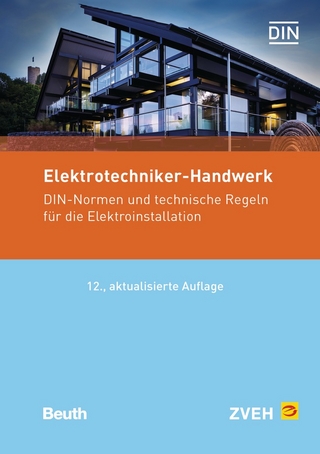
Accelerated Stress Testing Handbook
Wiley-IEEE Press (Verlag)
978-0-7803-6025-9 (ISBN)
As we move closer to a genuinely global economy, the pressure to develop highly reliable products on ever-tighter schedules will increase. Part of a designer's "toolbox" for achieving product reliability in a compressed time frame should be a set of best practices for utilizing accelerated stress testing (AST). The Accelerated Stress Testing Handbook delineates a core set of AST practices as part of an overall methodology for enhancing hardware product reliability. The techniques presented will teach readers to identify design deficiencies and problems with component quality or manufacturing processes early in the product's life, and then to take corrective action as quickly as possible. A wide array of case studies gleaned from leading practitioners of AST supplement the theory and methodology, which will provide the reader with a more concrete idea of how AST truly enhances quality in a reduced time frame.
Important topics covered include:
Theoretical basis for AST
General AST best practices
AST design and manufacturing processes
AST equipment and techniques
AST process safety qualification
In this handbook, AST cases studies demonstrate thermal, vibration, electrical, and liquid stress application; failure mode analysis; and corrective action techniques. Individuals who would be interested in this book include: reliability engineers and researchers, mechanical and electrical engineers, those involved with all facets of electronics and telecommunications product design and manufacturing, and people responsible for implementing quality and process improvement programs.
About the Editors H. Anthony Chan has been with AT&T Labs and the former AT&T Bell Labs for 14 years, specializing in product development and manufacturing, including interconnection technology, manufacture assembly and reliability, network management, and wireless network. He has been responsible for R&D in robust product design and manufacture and for guiding various manufacturing locations in planning and conducting reliability and stress testing programs. Dr. Chan has taught several training courses in reliability and stress testing and is a regular speaker on these topics. Moreover, he is an adjunct faculty member at the Hong Kong Polytechnic University. Paul J. Englert is a distinguished member of the technical staff in the Product Realization Department of Lucent Technologies' Wireless Networks Group. He is responsible for wide-scale deployment of mechanical computer-aided design (CAD) and work-in-progress data management solutions. Also, Dr. Englert develops Web-based, multimedia training tools for engineering practices and CAD tools and has lectured in China, Singapore, South Korea, and Taiwan on these subjects. Also, his experience spans a broad spectrum of projects in assembly, manufacturing, stress testing, chemical solvent replacement process development, and statistical modeling.
Foerword (F. Ianna).
Preface.
Acknowledgments.
OVERVIEW.
Introduction (H. Chan and P. Englert).
Principles of Stress Testing (H. Chan and P. Englert).
PROCESS AND GUIDELINES.
Stress Testing Program: Generic Processes (H. Chan and P. Englert).
Stress Testing Program Subprocesses (H. Chan and P. Englert).
Guidelines for Design and Manufacturing Stress Testing (H. Chan and P. Englert).
THEORY.
Economic and Optimization (H. Chan and P. Englert).
Reliability Growth (C. Seusy).
Overview of the Failure Analysis Process for Electrical Components (G. Pfeiffer).
EQUIPMENT AND TECHNIQUES.
Accelerated Stress Testing Equipment and Techniques (C. Felkins).
Vibration and Shock Inputs Identify Some Failure Modes (W. Tustin).
Relative Effectiveness of Thermal Cycling Versus Burn-In (K. Lo and F. LoVasco).
Accelerated Qualification of Electronic Assemblies Under Combined Temperature Cycling and Vibration Environments: Is Miner's Hypothesis Valid (K. Upadhyayula and A. Dasgupta)?
Liquid Environmental Stress Testing (LEST) (P. Englert).
Safety Qualification of Stress Testing (S. Rajaram).
BEST PRACTICES CASE STUDIES IN COMPUTER, COMMUNICATIONS, AND OTHER INDUSTRIES.
Production Ast with Computers Using the Taguchi Method (D. Pachuki).
Design Ast with Vendor Electronics (C. Schinner).
Design and Production Ast with Power Supplies (D. Dalland).
Design and Production Ast with Computers (E. Kyser).
Qualifications and Production Sampling Ast with Printed Circuit Boards (H. McLean).
Manufacturing Ast with Telecommunication Products (T. Parker and G. Harrison).
Productionn Ast with Computer Disks.
Benchmarking (H. Malec).
Glossary of Stress Testing Terminology.
Bibliography.
Index.
Epilogue.
About the Editors.
| Erscheint lt. Verlag | 11.5.2001 |
|---|---|
| Sprache | englisch |
| Maße | 179 x 269 mm |
| Gewicht | 821 g |
| Einbandart | gebunden |
| Themenwelt | Technik ► Elektrotechnik / Energietechnik |
| Technik ► Maschinenbau | |
| ISBN-10 | 0-7803-6025-7 / 0780360257 |
| ISBN-13 | 978-0-7803-6025-9 / 9780780360259 |
| Zustand | Neuware |
| Haben Sie eine Frage zum Produkt? |
aus dem Bereich


